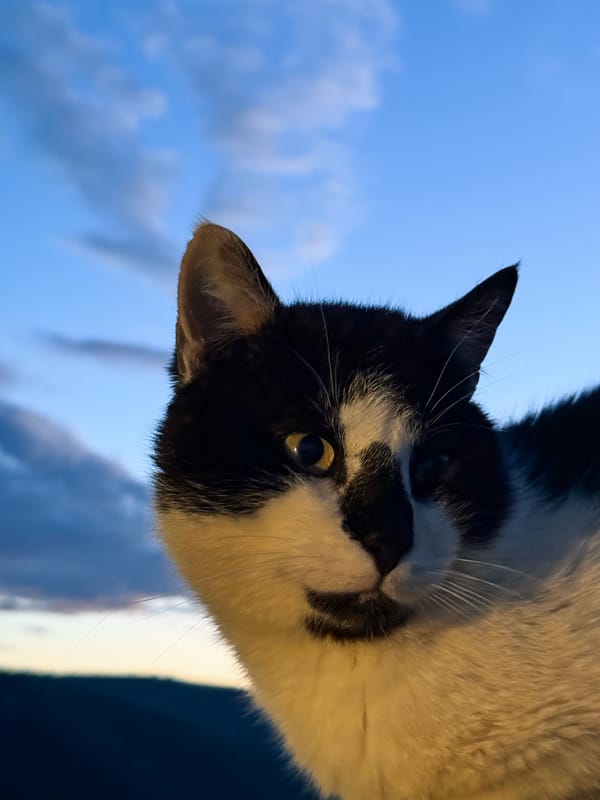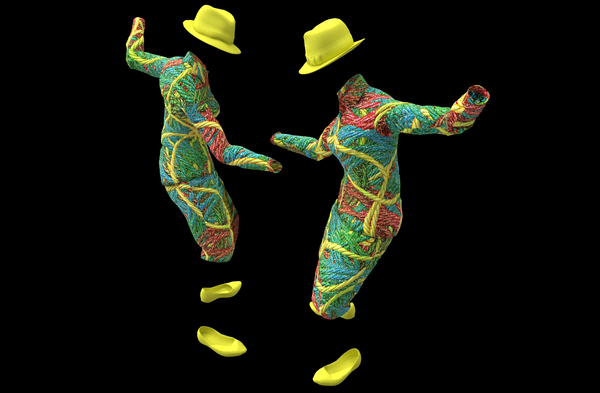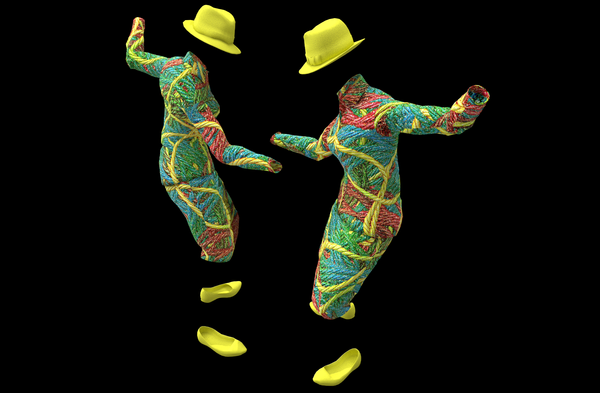📍 A Reflection on Solitude, Civic Disengagement, and the Poetic Presence in Public Life
The concept of "privacy" may seem innocent at first glance. It refers to private life, the personal sphere, the individual who lives away from exposure—away from the public gaze. Yet the word's history and political and philosophical depth reveal that "privacy" is never merely a personal choice. It is a condition, a position, a stance—and simultaneously a symptom of a Polis that no longer concerns itself with the individual. In this broader context, privacy becomes a barometer of civic health, reflecting whether the public sphere invites participation or alienates it.
From Ancient Greece to the digital present, the relationship between the individual and the Polis—the community, the state, and the collective body—remains constantly negotiable. "Privacy" is the mirror of that relationship. Nicholas V. K.'s poem, through its minimal form and reflective density, opens a dialogue that transcends literature and reaches into the very core of democracy, responsibility, and freedom. It invites the reader not merely to read but to dwell, pause, and reconsider their place within a society that increasingly blurs the lines between presence and absence.
Privacy as a Political Phenomenon
The word "idiotes" in Ancient Greece described someone who did not participate in public affairs. It carried no positive connotation—it was almost derogatory. The "idiotes" was inactive, uninvolved, and absent. Athenian democracy depended on the active engagement of its citizens; indifference to the Polis was seen not only as a personal failing but a civic illness. The state's health requires citizens capable of deliberation, collaboration, and responsibility.
Today, the term has transformed. In societies that glorify individualism, personal success, and autonomy, "privacy" is considered a right. One may withdraw from civic engagement, avoid voting, or remain silent in the public square. The Polis gradually shift into a bureaucratic system, distant from the collective imagination, while the individual retreats along their "personal path." Yet behind this perceived right often lies a more profound estrangement—an erosion of shared purpose.
This withdrawal is not innocent. As Nicholas V. K. reminds us, privacy within the Polis signals rupture. Social distancing—appearing voluntary—may be a reaction to a Polis that no longer provides space, voice, or hope. It may reflect the disillusionment of the citizen who finds no meaningful connection between their actions and the direction of public life.
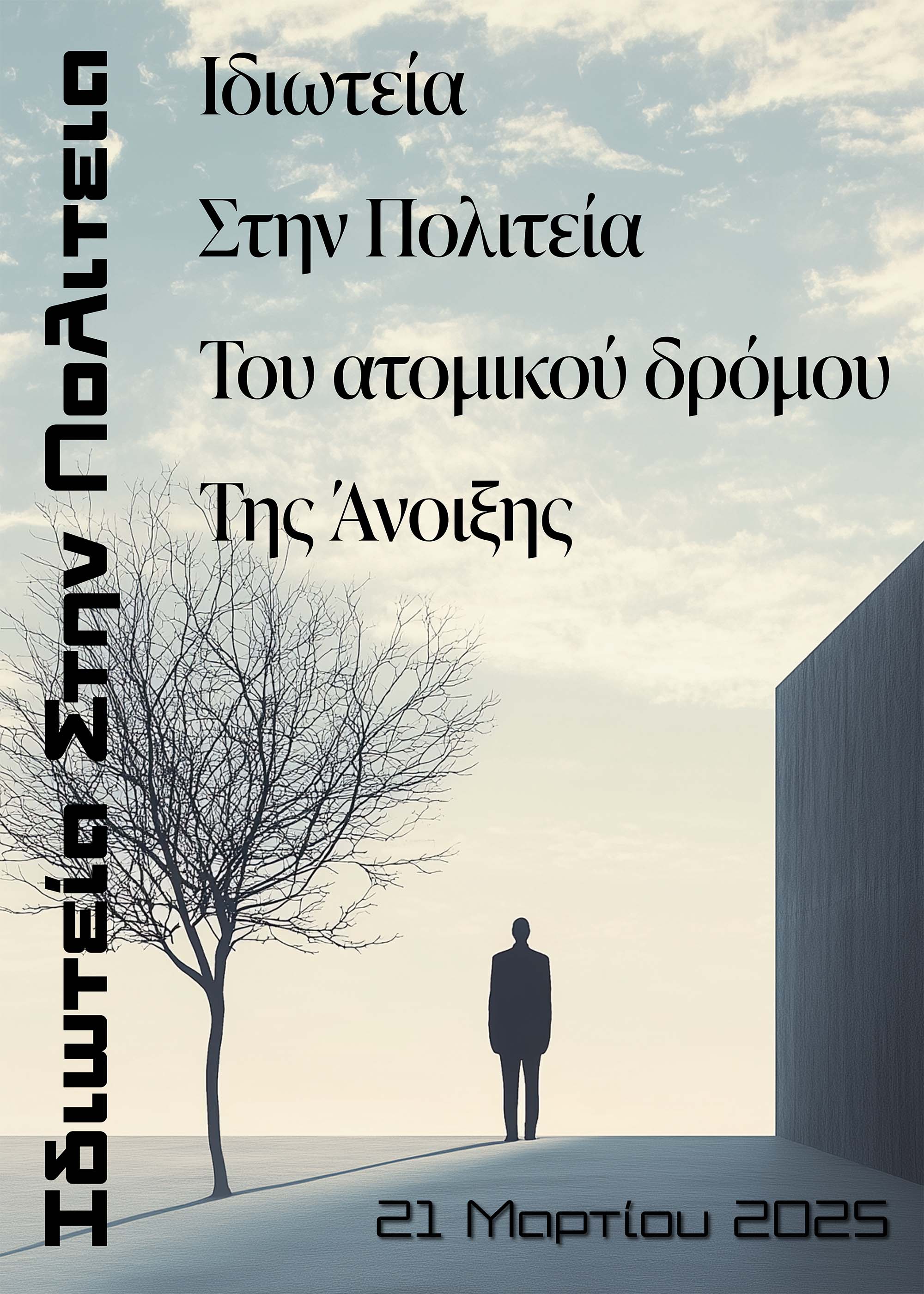
The Individual Path: Departure or Resistance?
The "individual path" described in the poem is the essence of an existential journey. It is not merely escape—it can also be an act of resistance. The personal path becomes a spiritual exercise in a world saturated with information, politicization, and often cynical power. It is the decision not to conform, consume, or shout merely for visibility. It is the quiet choice to re-center—to rediscover what it means to act with integrity.
Privacy, then, may be generative. It is the space where the individual is reassembled. It is the stillness between breath and speech, the silence that gives shape to future expression. Yet the boundary between contemplative withdrawal and apathetic detachment is delicate. When disengagement becomes permanent, when there is no intent to return or reconnect, privacy loses its poetic charge and becomes a mere escape.
So we must ask: Is the individual path of exile or pilgrimage? Is it born of despair or preparation? The ambiguity gives the image its power—it acknowledges the legitimacy of solitude without surrendering to nihilism.
The Polis as a Shared Vision
For a Polis to exist, there must be a shared vision. The concept of the Polis is not interchangeable with the state—it is more expansive and humane. The Polis is the space where individual life finds meaning through relationships. It is a realm of exchange, opposition, dialogue, and solidarity. When this vision collapses—when the community becomes transactional, and the citizen becomes a client—privacy becomes almost inevitable. A Polis without imagination invites silence, not speech.
Detachment from the Polis is often the legacy of betrayal: political promises broken, institutions eroded, and discourse degraded. In such a climate, poetry becomes a kind of ethical counterweight. It calls us to rethink language, reimagine community, and restore the Polis not as infrastructure but as ideal. Poets are not lawmakers in the traditional sense, but they shape the laws of memory, feeling, and possibility.
The absence of a compelling public narrative creates a void quickly filled by consumption, entertainment, or ideology. In such conditions, stepping back may be the only way to preserve the chance for authentic return. Nicholas V. K.'s poem is a gentle reminder that no Polis can be sustained without the moral imagination of its citizens.
Of Spring: The Seasonality of Hope
The poem ends with the word "Spring"—a loaded and hopeful signifier. Spring is the season of rebirth, hope, and light. To place privacy and the individual path in Spring is to frame solitude as a resignation and a prelude. This detail invites several interpretations:
- As irony: even amid renewal, some choose to retreat.
- As anticipation: that inner solitude may lead to more conscious engagement.
- As transition: from inertia to action, from silence to speech.
Spring here is more than a seasonal context—it is a symbolic invitation. The Polis may be reborn through privacy, provided privacy is understood not as abandonment but as an interlude. The symbolic force of Spring lies in its cyclical promise: there are always second chances.
Withdrawal does not have to be permanent. The solitary individual may prepare to bloom like a seed beneath the soil.
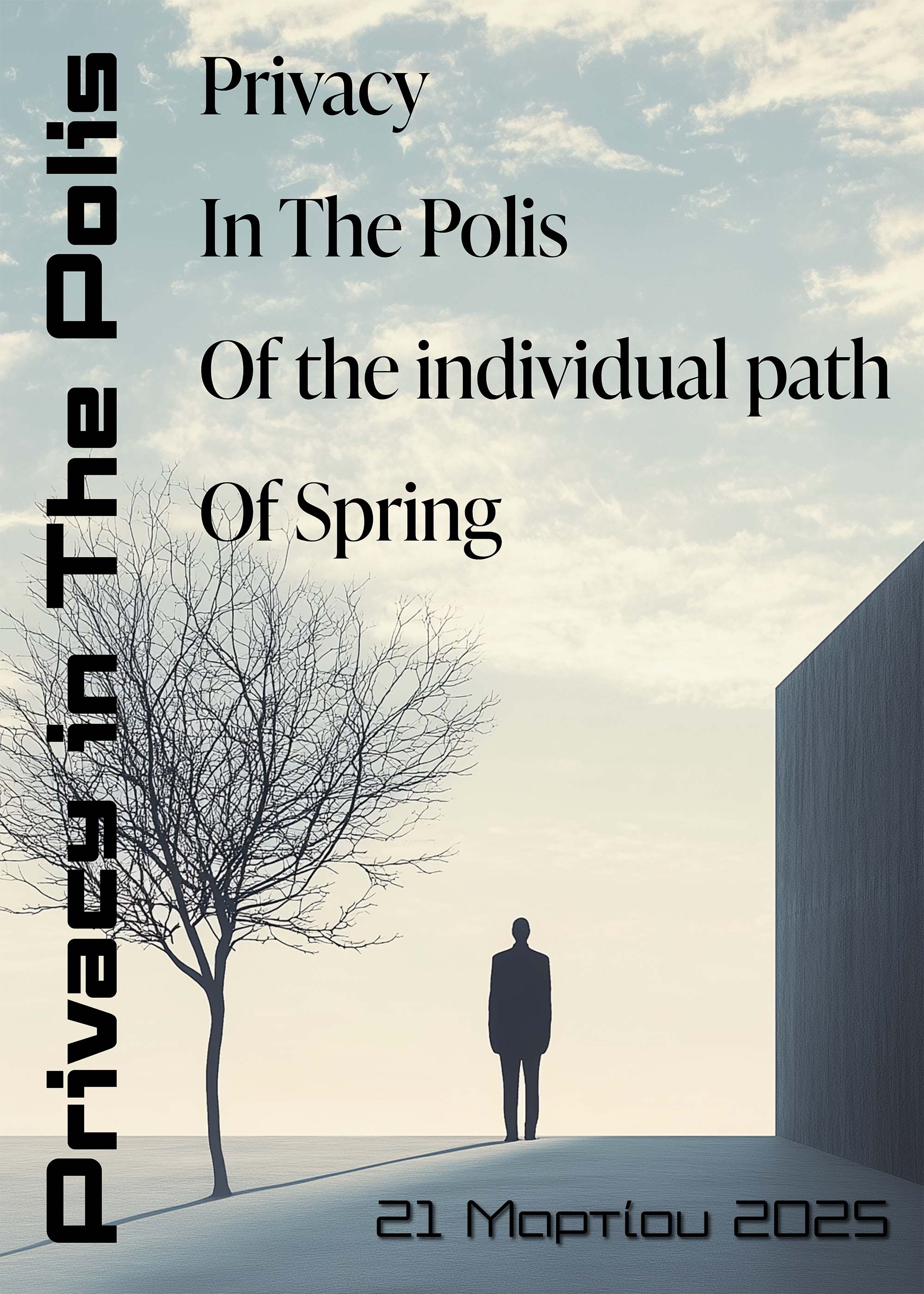
Modern Privacy: Digital and Existential
In the 21st century, privacy has evolved. We live in overexposure—social media, algorithmic visibility, and personal data constantly circulating. At the same time, we experience profound internal isolation. We are more visible and more alone than ever.
Digital filters and feedback loops now shape the Polis as a dialogue space. Civic participation becomes quantified—reduced to likes, shares, and hashtags. Public discourse fades into performance. Politics becomes theater. Within this environment, privacy becomes not just a choice but a default—a silent resistance to the noise.
This digital ecosystem cultivates passivity. It masks disengagement behind the illusion. Outrage replaces depth. Clicks replace conversation. The poet, however, takes a different path: reflection, stillness, and humanity.
Nicholas V. K.'s poem reminds us that privacy can be transformative. The challenge is to reclaim it—not as resignation but as readiness—not only for reentry into political life but for a more profound way of being.
Poetry and Politics
It is no accident that poetry expresses what politics no longer can. The poet does not issue commands but crafts images. He does not debate; he evokes. And in an era when "citizen" is replaced by "user," poetry may be the last sanctuary of hope.
"Privacy in the Polis" is a poetic lens on our age's ambivalence. We are within the system, yet outside it. We are citizens who do not feel like participants. We crave meaning yet doubt belonging. The self is fractured—longing for connection yet wary of institutions.
Poetry insists that words still matter. The inner life is not a retreat from the Polis but its source. Nicholas V. K.’s verses do not resolve contradictions—they give them form. They give silence a voice. They give solitude a seat at the civic table.
In doing so, they broadened our definition of politics. They reclaim vulnerability, reflection, and nuance as civic virtues. Perhaps, through poetry, the soul of the Polis might be rekindled.
Glossary of Key Terms
- Polis: (From Ancient Greek) Refers to the city-state, but in this context, it encompasses more than just the political structure. It signifies the community, the collective body of citizens, and the shared vision and values that bind them.
- Privacy: In the context of the text, it refers not just to the state of being alone but also to a condition, a position, and a stance taken by the individual in relation to the public sphere. It can be a form of withdrawal, resistance, or a space for contemplation.
- Idiotes: (Ancient Greek) Originally a derogatory term for a private person who did not participate in public affairs or civic life. Its meaning contrasts with modern notions of individual privacy as a right.
- Civic Engagement: Active participation and involvement of citizens in the public affairs and governance of their community or state.
- Social Distancing: In the context of the text, it refers not only to physical separation but also to a broader sense of detachment and lack of meaningful connection within the Polis.
- Individual Path: The journey or choices of an individual, particularly in relation to their engagement or disengagement with the Polis. It can be interpreted as escape or a form of resistance.
- Shared Vision: The common values, goals, and understanding that ideally bind the citizens of a Polis together and give meaning to their collective life.
- Ethical Counterweight: The role that poetry and art can play in providing moral guidance and alternative perspectives when public discourse and political institutions are perceived as degraded or lacking.
- Moral Imagination: The capacity to envision and understand ethical possibilities and the human consequences of actions, which the author suggests is crucial for sustaining a healthy Polis.
- Vernal Equinox: The day in the spring when day and night are of equal length, often seen as a symbol of balance and transition, used in the epilogue as a fitting time to reflect on the individual and the collective.
Epilogue: The Citizen's Return
The poem offers no answers—and therein lies its power. It does not moralize, preach, or instruct. It simply places four phrases within a single day: March 21st, 2025—the vernal equinox. A moment of balance between light and dark. It is a fitting time to meditate on the equilibrium—or fracture—between the individual and the collective.
Perhaps, in the end, "privacy" is not the negation of political life but its quiet genesis. It is where return becomes possible, readiness is shaped, and presence is prepared.
A well-placed verse may be more political than any proclamation in a world that often shouts without meaning.
"Privacy in The Polis" is not an ending. It is the beginning of a thought, a season, a pause before movement, a silence in which something stirs.
And in that silence, something begins.


